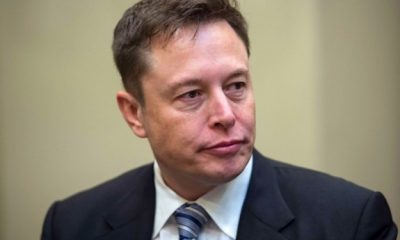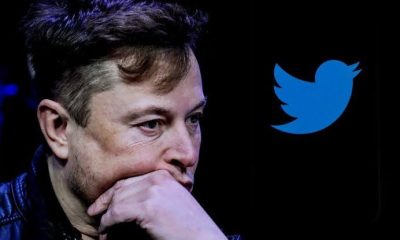BUSINESS
Elon Musk: How Risking It All Paid Off.
Published
2 years agoon
By
Joe Pee
By his own admission, the author reached out to Musk but was unsuccessful in securing a response. So Vlismas did what any competent researcher would do: He approached close associates and family for anecdotes but relied mainly on the public record.
Fortunately, finding information about this man wasn’t difficult in these highly connected times. But confirming or refuting the more outlandish tales proved to be more time-consuming.
Perhaps the best example was his father’s emerald mine in Zambia that supposedly launched Elon’s ship. The tale first surfaced in 2018 via a Business Insider article that has since been described as factually flawed.
Vlismas discovered that, yes, Elon Musk’s father Errol did own a part share of an emerald mine (how big is not revealed) in the mid-1980s. But after Russia started to produce perfect laboratory emeralds at one-tenth the price, investment completely dried up by 1989, when the business finally collapsed.
So, since Elon left South Africa in 1988 at the age of 17, he would undoubtedly have enjoyed some of the benefits of that investment while he was still in South Africa, but to suggest that it funded his business exploits in the mid-90s would also be flawed.
Many hurdles to jump
Vlismas weaves a narrative through the many facts he unearthed and provides context with many of the public utterances of Musk, his family and his associates over the years. What emerges is the story of a brilliant boy who grew to be a genius of a man but faced many obstacles along the way.
One of his greatest early obstacles was when young Musk was being mercilessly bullied during the two years he spent at Bryanston High School. It got so bad that, at one point, he was hospitalised for two weeks. It was an eye-opener for father Errol, who then moved him to Pretoria Boys High.
But it was when Elon left South Africa, his education began in earnest. For example, he found a hero in a biography by Walter Isaacson, Benjamin Franklin: An American Life. In Musk’s own words for one of America’s founding fathers: “He was basically just a runaway kid and created his printing business. He also did science and politics. He’s one of the people I most admire. Franklin is pretty awesome.”
According to Vlismas, “it was from the biography of Franklin and a range of other books that Musk taught himself the business skills he felt he needed. But he is by no means just a theorist on business. He knows what it means to work hard and make a company successful and often gets involved himself, sometimes to the company’s success and sometimes to its detriment.”
Speaking of gems
Musk’s view on management is one of the many gems sprinkled through Vlismas’ narrative. In a December 2020 interview with the Wall Street Journal, Musk said, “I think there might be too many MBAs running companies. There’s the MBA-isation of America, which I think is not that great.
“There should be more focus on the product or the service itself. Less time on board meetings. Less time on financials. What’s the point of a company at all? Why even have them?
“A company is an assembly of people gathered together to create a product or service and to deliver that product or service. Sometimes people lose sight of that. A company has no value in and of itself.
“It only has value to the degree that it is an effective allocator of resources to create goods and services that are of greater value than the cost of the inputs. This thing we call profits should just mean over time that the value of the output is worth more than what went in.”
An interesting juxtaposition
Perhaps the most exciting gem I found in the book was Musk’s view on unemployment caused by the adoption of technology. This is particularly poignant given his profile as an unabashed capitalist.
“What to do about mass unemployment? This is going to be a massive social challenge. And ultimately, we’ll have to have some kind of universal basic income. I don’t think we’re going to have a choice.
“I want to be clear [that] these are not things that I wish would happen. These are simply things that I think probably will happen.”
There is more, much more. Musk emerges from these pages as a bright yet complex human being who has risen above his many challenges. “It is the conundrum of Musk and explains the inability to categorise him, as well as the inability of many people to grasp exactly what he is all about,” writes Vlismas.
Elon Musk is an African success story. “On the one hand, he wraps his mind around impossible calculations and is generally accepted as a genius. But, on the other, he speaks with an almost childlike naivety about saving the world and making things people will love.”
He has become the wealthiest man in the world. That is an irony as it was never his goal. All he ever wanted to do was to create useful things.
You may like
-


Elon Musk changes his name to Kekius Maximus on X
-


Musk’s record $56bn pay deal rejected for second time
-


Elon Musk to Give $1 Million Daily to Swing State Voters Who Sign His Petition
-


Was Elon Musk born into wealth?
-


Elon Musk becomes first person to ever lose $200 billion.
-


Elon Musk admits to mistakes in his first two months in charge of Twitter.
-


Twitter employees in Ghana accuse Elon Musk of discrimination after they were sacked but not given same severance pay as Americans or Europeans.
-


The weird relationship between Elon Musk and actress Amber Heard.
-


Johnny Depp said he wanted to cut Elon Musk’s manhood for dating Amber Heard.























